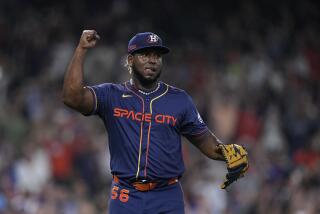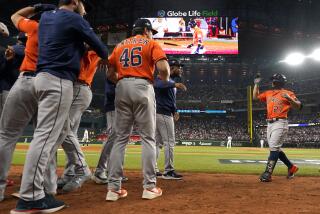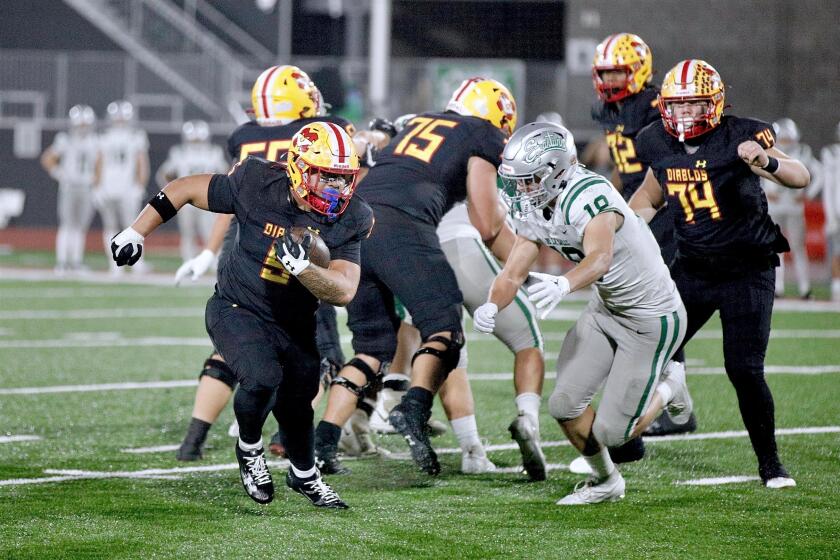Astros Bear Eerie Likeness to 1985 Royals
Since, for a little while this summer, they looked as if they might become the Washington Senators, let’s do the Houston Astros a favor. Let’s show them that there’s a rational argument in favor of their becoming world champions.
As a division champion heads into October, it needs to summon every conceivable reason to feel confident. A baseball team needs a model for success. It’s not as hard to win if you’re able to convince yourself that a team you resemble already has won a world title.
For the Astros, that would seem at first blush to be a tough job. They’re a peculiar, unlikely, underdog collection, a kind of club rarely found in the playoffs, let alone the World Series. True, Dodgers Manager Tommy Lasorda -- who boasted, “The Astros are just renting first place” -- is now feasting on crow linguine. Still, Houston can use all the inspiration it can muster.
What makes the Astros go? And has a similarly constructed team ever won?
Hint: surprise answer to quiz.
Houston is a quick, light-hitting team built on a deep, balanced pitching staff with only one true starting ace (Mike Scott) and one dominant reliever (Dave Smith). The Astros, who play in a roomy artificial-turf park that discourages home runs, have only one frightening hitter (Glenn Davis) and a mild-mannered, little-known manager (Hal Lanier).
Getting warm yet?
The franchise never has won a world title, has a conservative organization philosophy stemming from General Manager Dick Wagner, and can’t come close to matching up on paper with the team it must meet in the playoffs. The Astros’ trump -- its team ERA -- is second-best in baseball, but those nasty, glamorous New York Mets are No. 1.
Is any of this starting to ring a bell?
Sure, the Astros are almost clones of the 1985 Kansas City Royals. It would be hard to create teams more similar. Every Astros fact mentioned above is paralleled by those champion Royals.
Scott, with his 298 strikeouts and 18-10 record, could be the Cy Young Award winner, just as postseason hero Bret Saberhagen was last year. Smith (32 saves) is close to being his league’s reliever of the year, as Dan Quisenberry was. Davis, who has 30 homers and 97 RBI, plays the Lone Slugger role of George Brett. Rookie manager Lanier and Kansas City’s quiet Dick Howser might be brothers; Lanier introduced the Astros to speed, fundamentals and discipline.
The comparisons go further. Kansas City’s No. 2 starter, who was so effective in October 1985, was an over-30 veteran left-hander with plenty of breaking stuff who was having his best year -- Charlie Leibrandt. Well, say hello to Houston’s Bob Knepper (16-12, 3.13). Next, for the Royals, came a hard thrower with control trouble and a history as a .500 pitcher -- Danny Jackson, a kind of young, less swift Nolan Ryan. Naturally, Houston has the old Nolan Ryan (11-8, 188 strikeouts in 171 innings).
The Royals also had a promising newcomer who could start or relieve in Mark Gubicza, a 14-game winner; the Astros have southpaw Jim Deshaies (10-5), one of the pitchers the Yankees are sorry they traded, now that he’s having a hot stretch run. Kansas City got especially tough in October because the plethora of off days made their bullpen very deep; the long Astros bullpen, led by Charlie Kerfeld (11-2), Larry Andersen and Aurelio Lopez, has been a strength all year.
Just like the Royals, the Astros are in the bottom half of their league in team scoring (eighth), but near the top in steals (six men in double figures, led by Bill Doran with 41). Also, like the Royals, the Astros play a club that’s clearly better -- on paper. The Toronto Blue Jays won eight more games than the Royals, St. Louis won 10 more. The Mets have a dozen more wins than Houston’s 91 -- yet the Astros have played well against New York this year.
The major difference between the ’85 Royals and the ’86 Astros is that Houston probably is better.
The Royals were pathetic hitters. The Astros are not. Kevin Bass (.313, 20 homers) and Danny Walling (.314) are among the NL’s top 10 batters. Several other Astros are solid veteran hitters who are not intimidated by top-line pitching and know how to peck away for three or four runs in a close game. Doran (.278), Jose Cruz (.275, 70 RBI) and Phil Garner (.275) will not hit many, if any, postseason homers. But they can hit-and-run and poke ‘em where they ain’t.
Houston also has loosened its purse strings to bring in such veterans as Dave Lopes, Dan Driessen and Danny Darwin to show everybody that, even if attendance is weak in Texas, the club’s commitment to winning is fairly strong.
What Houston probably lacks -- and it may have been the central ingredient in the Royals’ historic comebacks from a pair of three-games-to-one deficits -- is a sense of collective mission. The Royals felt frustrated in the postseasons of ‘76, ‘77, ‘78, ‘80, ’81 and ’84. A core of veterans had been through it together and were fed up. The Astros’ main bond is the way the club (and its uniforms) has been mocked on the road and ignored at home.
However, the Astros do have hidden edges. One is a home-field advantage in the Astrodome -- the Eighth Blunder of the World. Just as belligerent Yankee Stadium can daunt foes, so the Astrodome can depress visitors. “I hate playing here. I think 90 percent of the players hate it,” said Cincinnati’s Dave Parker. “First you have the (dim) lights to contend with, and the worst turf in the league, and the (gray) roof, which makes it hard to see the ball in a day game.”
The Reds, and Parker, muttered so much about the Astrodome that they forgot to beat the Astros. Houston had a 14-4 season advantage, more than accounting for its nine-game division lead on Cincinnati. Whereas Parker had three RBI against Houston, Davis had 18 against the Reds.
The Astros also have the advantage that most the playoff pressure will be on the Mets. After all, experts (such as Sports Illustrated) picked Houston to lose 100 games. The National League still is learning that these aren’t the 1974 Astros who blew a 10-game July lead after Tom Seaver’s famous prediction, “The Astros will fall through the division like a lead balloon.”
The Astros know they are only renting first place. But, like those upstart Royals who refused to be evicted, they’re starting to believe that their lease might run right through October.
More to Read
Go beyond the scoreboard
Get the latest on L.A.'s teams in the daily Sports Report newsletter.
You may occasionally receive promotional content from the Los Angeles Times.










